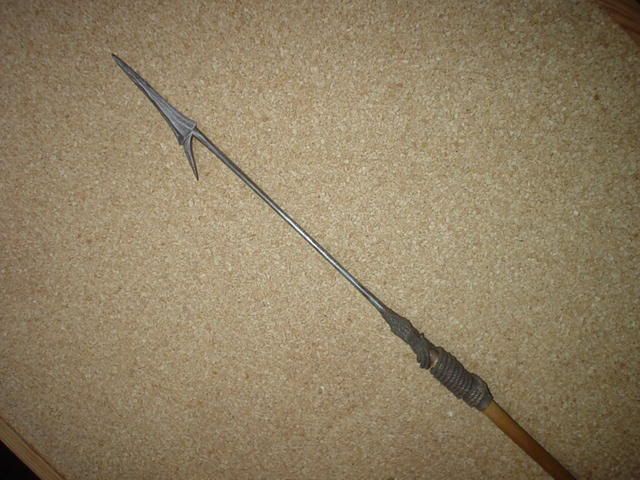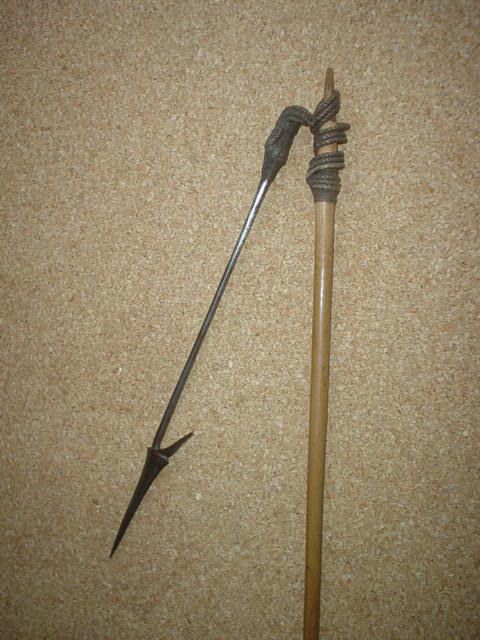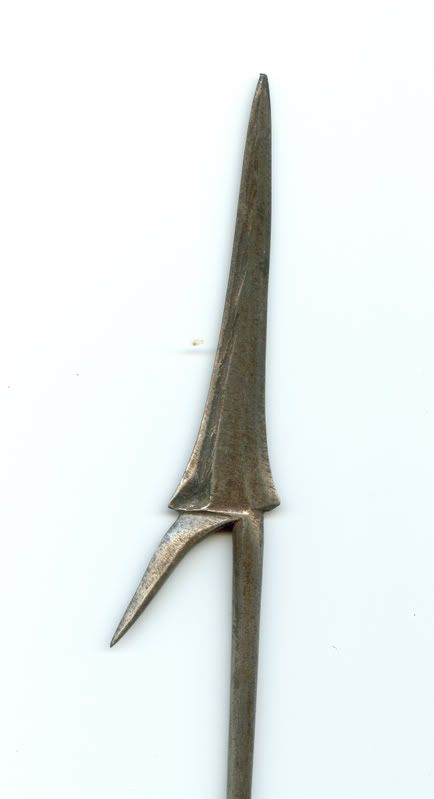
 |
|
|
#1 |
|
Member
Join Date: Dec 2006
Location: New Jersey, USA
Posts: 16
|
Can anybody identify the provenance of this spear from the Philippines? The spear head is detachable from the shaft.
|
|
|

|
|
|
#2 |
|
(deceased)
Join Date: Dec 2004
Location: East Coast USA
Posts: 3,191
|
Looks like a whale harpoon to me and not a Philippine spear.
Lew |
|
|

|
|
|
#3 | |
|
Member
Join Date: Mar 2005
Location: USA Georgia
Posts: 1,599
|
Quote:
Yup. |
|
|
|

|
|
|
#4 |
|
Member
Join Date: Nov 2006
Location: The Netherlands
Posts: 2,224
|
I have 2 slightly similar harpoons with crudely forged points and the shafts being roughly made. they came from a collection of more than 30 indonesian spears.
|
|
|

|
|
|
#5 |
|
Member
Join Date: Dec 2006
Location: New Jersey, USA
Posts: 16
|
May I know the purpose of having the harpoon head detachable from the shaft?
Does the Indonesian harpoon also have rattan bindings? |
|
|

|
|
|
#6 |
|
Member
Join Date: Nov 2006
Location: The Netherlands
Posts: 2,224
|
The detachable point makes that the shaft/stick does not break.
And although I have never caught any seamamal myself, I can imagine that if the point would be fixed rigidly to the shaft it would also make it impossible to hold on to the harpoon. The 2 harpoons I have have very simple rattan bindings and some black rope also wrapped around the shaft. maybe If I have time this weekend I will make some pictures. Best regards, Willem |
|
|

|
|
|
#7 |
|
Member
Join Date: Dec 2004
Location: Sint-Amandsberg (near Ghent, Belgium)
Posts: 830
|
Willem, I'm not sure from your picture. But this could also be a Congolese harpoon spear.
|
|
|

|
|
|
#8 |
|
Member
Join Date: Nov 2006
Location: The Netherlands
Posts: 2,224
|
hello Freddy,
The picture posted here is not mine. And Congo or Philipines, any guess goes. Best regards, Willem |
|
|

|
|
|
#9 |
|
Member
Join Date: Dec 2004
Location: Sint-Amandsberg (near Ghent, Belgium)
Posts: 830
|
oeps, sorry Willem. My mistake.
  For the moment, I can't find a good pic of a Congolese harpoon spear. So I took a scan and some pics of a harpoon arrow in my collection. The total length of this piece is 129 cm. This is an implement used for hunting, but just look at the beautifully forged iron arrowhead. Look at the cord attachment. It resembles the one shown by ligpo2001. The arrowhead is loose and fits over the shaft. Ligpo2001, how is your spearpoint fixed to the shaft ?   
|
|
|

|
|
|
#10 |
|
Member
Join Date: Jan 2006
Location: Kent
Posts: 2,653
|
I think Freddy could be right.....not necessarily Congolese....but Africa seems likely. These are still used today to hunt crocodile.......at night. They use small 'shallow-draft' hulled canoes, usually 2 hunters per boat. Using a light they can 'pick out' the glowing eyes of the crock (the light is reflected back...think 'cats eyes'), making them 'easy' to find. The animal is harpooned, the shaft falls away ( crocks would 'roll' in an attempt to escape....if the shaft was 'fixed' to the spearhead, it would be likely the spear...head and all would be dislodged......allowing escape.) Once the reptile tires, it is hauled into the boat, using the rope attached to the harpoon head. This is the most dangerous part, as often the crock will make a last desperate attempt to escape...snapping and swinging its powerful tail....injuries to the hunters is not uncommon.
|
|
|

|
|
|
#11 |
|
Member
Join Date: Nov 2006
Location: The Netherlands
Posts: 2,224
|
Ligpo,
Can you also advise some sizes/measurements of the harpoon ? Best regards, Willem |
|
|

|
|
|
#12 |
|
Member
Join Date: Dec 2006
Location: New Jersey, USA
Posts: 16
|
I have 6 of these sort of spears, with various lengths:
Shafts from 140 to 177 cm Heads from 20 to 30 cm All the heads (tangs) fit into the shafts. I also have 2 other similar spears (also from the Philippines). The heads of these however are those of spears (i.e. not harpoon like), detachable from the shafts, and connected by rope to the shafts. If I were to assume that these are not harpoons, then the detachable feature of the heads make sense when hunting mammals in the forests. The speared animal will have difficulty escaping because the shaft will eventually get caught between bushes and trees while it flees. This is just my guess though. |
|
|

|
|
|
#13 |
|
Member
Join Date: Aug 2006
Location: Belgium
Posts: 171
|
I have this nice ngbandi/Bati (Yakomo) harpoonspear. This one was used for hunting big animals like hippo's. The shaft is 90 cm and the spearhead about 51 cm.
More "rough" pieces where made by the Poto. I agree with Ligpo2001 about the use of the detachable heads, makes animals get caught between bushes and trees while it flees, the Poto spears have often long wooden floaters attached. (Westedijk) Greets Guy |
|
|

|
|
|
#14 |
|
(deceased)
Join Date: Dec 2004
Location: OKLAHOMA, USA
Posts: 3,138
|
I WOULD GUESS THAT THEY ARE HARPOONS ALSO, THE DETACHABLE HEAD USUALLY INDICATES IT WAS TO BE USED ON LARGE PREY. THE LINE BEING ATTACHED BETWEEN THE POINT AND SHAFT OR ATTACHED ONLY TO THE POINT WOULD INDICATE HUNTING MARINE PREY. THIS SYSTEM IS USED ON MODERN SPEAR GUNS, THE SPEAR PENETRATED DEEPLY AND WHEN THE FISH PULLS THE SHAFT COMES OFF AND OUT OF THE WOUND THE LINE FROM SHAFT TO POINT IS ATTACHED SO WHEN IT PULLS IT TURNS THE POINT CROSSWISE SO IT CANNOT BE PULLED OUT AS EASILY. IF THE SHAFT WERE LEFT ATTACHED IT WOULD WORK AGAINST THE WATER AND THE WOUND AND OPEN IT UP OFTEN CAUSING THE POINT TO BECOME DISLODGED AS WELL AS BENDING OR BREAKING THE SHAFT.
I HAVE SEEN SOUTH AMERICAN INDIAN ARROWS THAT HAVE A VERY LARGE SHAFT AND DETACHABLE POINT. WHEN THE ARROW STRIKES THE SHAFT COMES LOOSE AND FLOATS TO THE SURFACE THE LINE IS WRAPPED AROUND THE SHAFT AND UNWINDS THE HUNTER PADDLES OVER AND PICKS UP THE SHAFT AND GETS THE LINE AND PULLS IN THE CATCH. HARPOONS LIKE THE FIRST ONE COULD BE USED ON HIPPO, CROCODILES,DUGONG,PORPOSE,LARGE FISH ECT. THE ONLY DETACHABLE POINTS I AM AWARE OF FOR HUNTING ABOVE WATER WERE DESIGNED TO STAY IN THE WOUND SO THE ANIMAL COULD NOT REMOVE THEM WITH THE SHAFT AND WERE OFTEN POISONED. HAVING A SHAFT ATTACHED TO A POINT AND CATCHING IT IN THE BRUSH WOULD GIVE THE PREY A BETTER CHANCE OF DISLOGING THE POINT INSTEAD OF CATCHING HIM , BUT IT MIGHT WORK ON SMALLER PREY OR WITH VERY GOOD BARBS. Last edited by VANDOO; 13th January 2007 at 06:04 PM. |
|
|

|
|
|
#15 | |
|
Member
Join Date: Aug 2006
Location: Belgium
Posts: 171
|
Quote:
(www.wereldorientatie.net) |
|
|
|

|
|
|
#16 |
|
Member
Join Date: Dec 2006
Location: Philly
Posts: 72
|
I have seen some whale harpoons with detatchable heads. It was used by relatively modern hunters. They attached several plastic jugs to the line to serve as floaters. They stuck the whale with four or five harpoons. The floaters slowed the whale down enough to deliver the death blow. I don't recall exactly how it was delivered. I've also seen detatchable heads when hunting seal. A small breathing hole is cut into the ice. A feather is placed at the end of the hole. The hunter lays on the ice for days at a time with his eyes locked on the feather. When the prey breaths through the hole, the feather moves, indicating the prey is in place. The hunter then jabs his harpoon through the hole, usually stabbing the prey in the face. He pulls out the shaft, leaving the prey suspended by the attached line. He then cuts out a hole large enough to remove the kill.
|
|
|

|
|
|
#17 |
|
Member
Join Date: Aug 2006
Location: Belgium
Posts: 171
|
@nKanta
You are right, I was to fast with my conclusion  Just found this picture of whale spears with detatchable heads (http://www.photolib.noaa.gov/historic/nmfs/figb0195.htm) |
|
|

|
|
|
#18 |
|
Member
Join Date: Dec 2004
Location: What is still UK
Posts: 5,806
|
I do not see the thread starting harpoon as a whale harpoon. The whole thing is too light, the cordage too light and simple. Can you imagine pulling a dead whale through water on such cordage. I am an angler and can spend an entire day at the river and only catch a lump of weed, try pulling that through water on light line.
|
|
|

|
|
|
#19 |
|
Member
Join Date: Dec 2004
Location: What is still UK
Posts: 5,806
|
Who remembers "Mountain" and the art work on the album cover to Nantucket sleigh ride. Ahh youth wasted on the young

|
|
|

|
|
|
#20 |
|
Member
Join Date: Dec 2006
Location: Philly
Posts: 72
|
Personally I would use a heavier harpoon. But then again I've never hunted whale. I agree that the original harpoon probably is not for something as large as a whale, but I believe that the line attached to the head is not for reeling in. For whale harpoons, floaters would most likely have been attached in order prevent the animal from diving. In some hunts the whales mouth was sewed shut after death in order to trap air as a way to maintain boyance. It was then towed back to solid ice by the tail. This line would have benn the most sturdy.
|
|
|

|
|
|
#21 |
|
Member
Join Date: Dec 2006
Location: New Jersey, USA
Posts: 16
|
I agree with Tim that this spear will not be effective for whales and other large marine animals.
What confuses me if that if I were to assume that the weapon is for small mammals, then how come it was made with only one barb? Logic would indicate that one barb will be less effective in holding the head in place within the speared animal that if there were more barbs. |
|
|

|
|
|
#22 |
|
EAAF Staff
Join Date: Feb 2005
Location: Centerville, Kansas
Posts: 2,196
|
I would have to say that the original spear at the beginning of the thread was most likely for medium to larger fish. The shaft behind the tip is short but the tip has a large barb with a wide back for holding. Harpoons for very large animals or fish most often have a long shaft for deeper penetration through thick skin and blubber in hopes of hitting vital organs to help in the quicker death of the intended target. As far as multiple barbs over a single the holding power is mostly dependent on the width of the back side of the barb and the length of the barb itself.
Robert |
|
|

|
|
|
#23 |
|
(deceased)
Join Date: Dec 2004
Location: OKLAHOMA, USA
Posts: 3,138
|
IN A RIVER OR LAKE OR SHALLOW WATER THE HUNTED ANIMAL DOSEN'T HAVE AS DEEP OR LARGE AN AREA TO TRY TO ESCAPE. SO IT IS LIKELY YOU WILL HAVE A GOOD CHANCE TO USE SEVERAL HARPOONS OR SPEARS TO FINISH HIM OFF AND THEN A SMALL LINE TO PULL THE CARCASS UP TO THE SURFACE AND TIE A LARGER LINE ON TO PULL THE CRITTER IN OR TOW HIM ALONG SIDE THE BOAT.
THE MAIN REASON I CAN SEE FOR NOT MAKEING THE BARBS MORE NUMEROUS OR FACEING BOTH WAYS IS SO IT CAN BE MORE EASILY REMOVED TO USE AGAIN. JUST SLIDE A SPEAR OR KNIFE DOWN BESIDE THE POINT CUT THE BARB LOOSE OPEN THE WOUND AND PULL IT FREE AND GET READY TO SPEAR THE NEXT CRITTER. |
|
|

|
|
|
#24 |
|
Member
Join Date: Mar 2005
Location: USA Georgia
Posts: 1,599
|
I have what appears to be a kalinga harpoon. The head is a little loose and probably detachable, but I don't want to pull it entirely loose.
The overall picture is a little distorted, I could not, at the time I took this picture, get high enough to photgraph straight down. Comments? |
|
|

|
|
|
#25 |
|
Vikingsword Staff
Join Date: Nov 2004
Posts: 6,290
|
I thought I saw an example of the original spear in this post somewhere in Fagan's online catalogue.
|
|
|

|
|
|
#26 | |
|
Member
Join Date: Mar 2005
Location: USA Georgia
Posts: 1,599
|
Quote:
|
|
|
|

|
|
|
#27 |
|
Vikingsword Staff
Join Date: Nov 2004
Posts: 6,290
|
|
|
|

|
 |
|
|